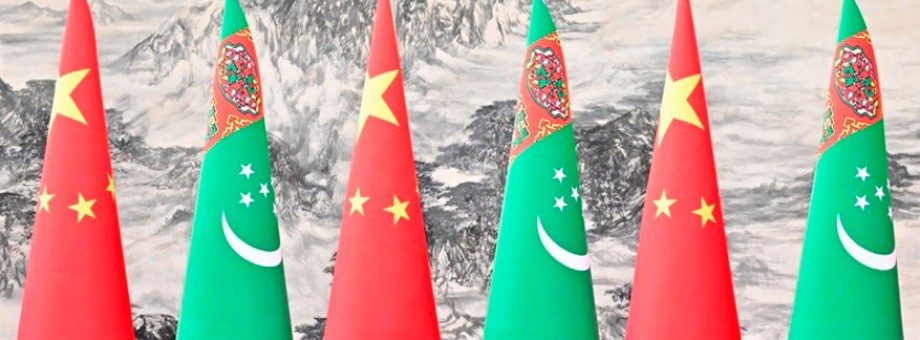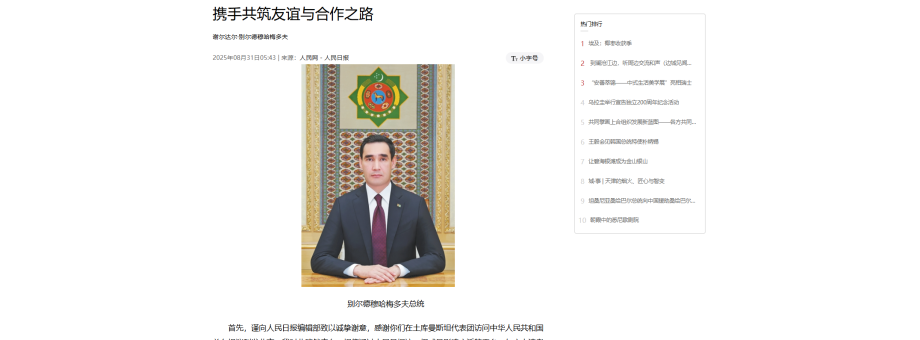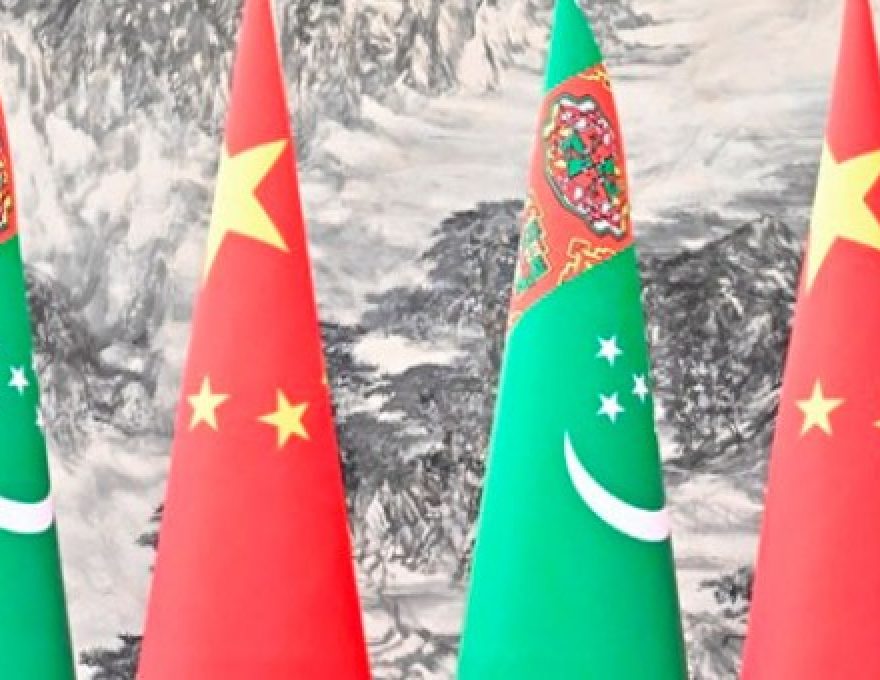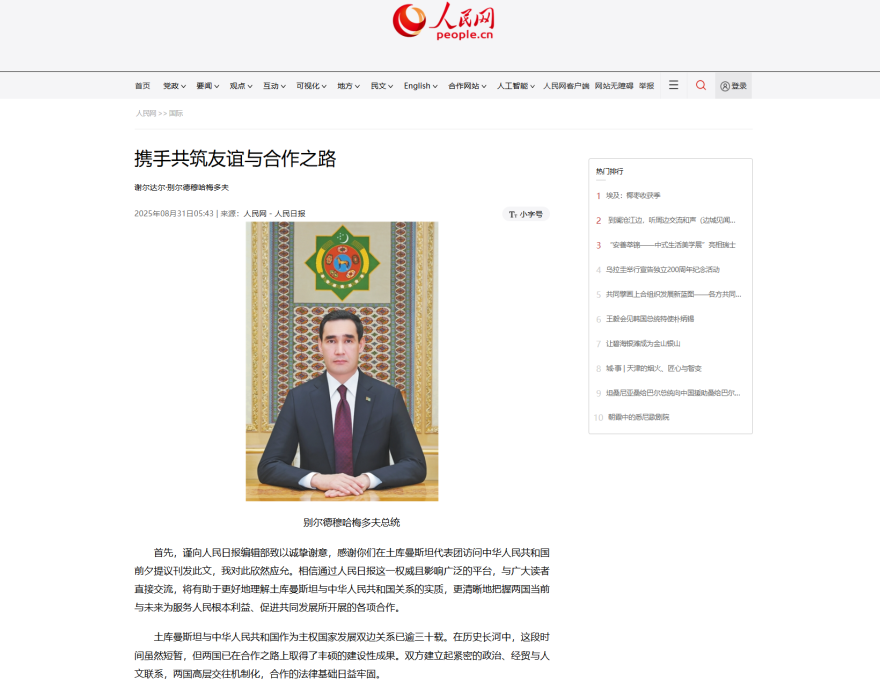THE NEWSPAPER “RENMIN RIBAO” PUBLISHED AN ARTICLE BY THE PRESIDENT OF TURKMENISTAN “TURKMENISTAN – CHINA: ON THE PATH OF STRENGTHENING FRIENDSHIP AND COOPERATION”
Dear Chinese friends!
First and foremost, I would like to express my gratitude to the leadership of the newspaper for the initiative to publish this article on the eve of the visit of the Turkmenistan delegation to the People’s Republic of China. I readily responded to this proposal. I believe that a direct address to the multimillion-strong readership of such a respected and authoritative publication will help them better understand the essence of relations between Turkmenistan and the People’s Republic of China, as well as more clearly appreciate the current and future joint activities of our two states for the benefit of our peoples and in line with their fundamental interests.
For more than 30 years, Turkmenistan and the People’s Republic of China have been developing their relations as independent states. In this relatively short period by historical standards, a significant path of constructive development has been traveled. Close political, trade, economic, and humanitarian ties have been established. Contacts between the leadership of the two countries have become regular, and a solid legal foundation for cooperation has been created.
In September 2013, a historic event took place that determined the essence and direction of our relations for the long term: in Ashgabat, a Joint Declaration was signed on the establishment of a strategic partnership between Turkmenistan and the People’s Republic of China. Furthermore, in May 2014, the Joint Declaration on the development and deepening of the strategic partnership between Turkmenistan and China and the Statement on the adoption of the Development Plan for Strategic Partnership Relations for 2014–2018 were adopted.
At the same time, when speaking of the indisputable achievements in the modern development of bilateral ties, one cannot view them apart from the deep centuries-old common heritage that unites our peoples. I am convinced that this heritage has become the strongest and most fundamental pillar of today’s deeply grounded realities of Turkmen–Chinese comprehensive strategic partnership.
Historical documents, chronicles, and literary monuments preserve irrefutable evidence of the close political, trade, commercial, and cultural contacts between Turkmens and Chinese. These contacts span centuries. Over the ages, a special type of relationship between our peoples was formed, accompanied by mutual acquaintance and understanding. It must be emphasized that this was a beneficial, positive, and creative process, one that encompassed many spheres and significantly influenced the civilizational development of Asia, contributing to the prosperity and mutual enrichment—both material and spiritual—not only of Turkmens and Chinese but also of other peoples of the continent, including immediate neighbors and more distant nations.
The key factor of this historical trajectory, in which our peoples participated, was the Great Silk Road. I am convinced that it is deeply logical, true, and just that today we consider ourselves heirs and continuators of this historical fact. It is natural that in characterizing China’s “One Belt, One Road” initiative and Turkmenistan’s “Revival of the Great Silk Road” initiative, we emphasize the closeness, philosophical affinity, and practical equivalence of these two significant, large-scale projects.
In the political sphere, the intergovernmental interaction between Turkmenistan and China today is characterized by mutual trust, openness, and a high level of constructiveness. Meetings and negotiations between the heads of state are always substantive and responsible strategic dialogues that cover the most important areas of bilateral cooperation and interaction on the international political arena.
The approaches and views of Turkmenistan and the People’s Republic of China are close or coincide on fundamental issues of global order. Our states firmly and unambiguously stand for the creation of a stable and secure international architecture based on equality, mutual respect, justice, predictability, and recognition of multilateral interests. The foundation of such an order is the UN Charter and the system of international law. Turkmenistan and China work tirelessly toward this in multilateral structures. The established practice of mutual support has become a good tradition. This is a deeply thought-out, farsighted diplomatic line of our two countries, based on a correct assessment of events and processes with a long-term perspective. A vivid example of such an approach was China’s support for Turkmenistan’s neutrality. The highest authority of China and its active position played an important role in the international recognition of Turkmenistan’s permanent neutrality during the adoption of the first and subsequent UN General Assembly resolutions. Today, Turkmen neutrality, as an important positive factor in international and regional politics, objectively contributes to the success of the People’s Republic of China in achieving peace, stability, and good-neighborliness in Asia and throughout the world.
In turn, Turkmenistan has always expressed itself honestly, openly, and with principle on matters of relevance to China, including those concerning the unity of the People’s Republic of China, its territorial integrity, and the fight against terrorism, extremism, and separatism.
On the global political stage, Turkmenistan and China are united in their conviction of the need to enhance the role of developing countries, ensuring them a worthy place in the international agenda on such issues as energy and food security, combating epidemics and diseases, and human rights, including the fundamental rights to life, safety, and health. In this context, it is appropriate to recall the solidarity and mutual assistance shown by Turkmenistan and China during the most difficult period of the COVID-19 pandemic. We will always be grateful to China for its support in providing medicines and equipment to Turkmenistan. “True friendship is revealed in difficult times”—this ancient Chinese wisdom fully applies to the relations between Turkmenistan and the People’s Republic of China. Our friendship has honorably withstood difficult tests.
Year after year, Turkmen–Chinese cooperation is being improved and strengthened in regional dimensions. Productive dialogue has been established within the “Central Asia–China” format. Turkmenistan actively and regularly participates in summits of major multilateral structures in which China is a member. In particular, I would like to note the forthcoming participation of Turkmenistan’s delegation at the highest level in the Shanghai Cooperation Organization Summit as an honored guest.
In this regard, special attention must be paid to the progress and prospects of the Turkmen–Chinese strategic partnership in the economy, primarily in the energy and transport sectors.
I am convinced that our opportunities here are immense. Their utilization is already yielding impressive results, positively and significantly influencing continental geo-economic realities.
Among the largest joint achievements in the energy sector, we rightly name the strategic gas pipeline “Turkmenistan–China,” commissioned in 2009. This unique engineering project is the result of the political will and determination of the leadership of both countries and reflects their mutual capacities and potential. In essence, the pipeline became not just a means of delivering large volumes of Turkmen natural gas to China but also a prototype of a fair, mutually beneficial, and sustainable configuration of the energy security system on the continent. We can take pride in this achievement, whose fruits have given a powerful impetus to the development of the economies of Turkmenistan and China, as well as of the transit states, and to the entire system of relations in the energy space of Eurasia. Cooperation between Turkmenistan and China in this field will continue to grow. It has proven its economic viability and its conformity with long-term, mutual, and multilateral interests.
Turkmen–Chinese transport partnership is also gaining ever greater significance. As already noted, our views on the essence and objectives of transport strategies are close and compatible. This is a good foundation for combining geographical advantages and financial, organizational, political, and diplomatic resources to create an integrated and combined system of transport and logistics corridors along the East–West axis. This is the most promising and productive way of bringing Asia and Europe closer together on sustainable principles of mutual benefit and equal partnership. Turkmenistan and China are destined to play a key role in this endeavor, and we are grateful to our Chinese partners for their readiness to cooperate. I am confident that this promising transcontinental project will be successfully implemented and will become yet another powerful bond of our strategic partnership in the 21st century.
Once again, let me return to historical parallels and the centuries-long experience of mutual communication, including in economic and trade spheres between the Turkmen and Chinese peoples.
At the current stage, this heritage is no less relevant, and I believe we should use it together and effectively apply it in the practice of business cooperation. I am certain that Turkmen and Chinese business communities have much to offer one another. The revival of trade ties, their diversification, and joint projects in small and medium-sized business will significantly impact the development of specific sectors of our economies, bring real commercial benefits, improve the well-being and living standards of our peoples, and help resolve social issues. Within the framework of the bilateral economic dialogue, we pay due attention to the investment segment. There is understanding and willingness to move toward real joint projects, and mutual government-level support exists for this process. This gives us reason to look to the future with optimism and to confidently plan our cooperation.
Today, the technological sphere of Turkmen–Chinese partnership is in particularly high demand. In our country, the development of the economy, the social sphere, urban planning, and production industries is gradually being put on an innovative track. We appeal to the Chinese side with a proposal to participate in this process on a mutually beneficial and long-term basis. I must say that this proposal has met with a positive response in China, among the leadership of specialized agencies and companies.
An enormous, indeed boundless, dimension of cooperation is the humanitarian sphere. This is natural for two countries and peoples united by feelings of friendship, brotherhood, mutual respect, and trust.
Today, our humanitarian ties are directed toward meeting each other’s needs and mutual interest in studying the history and culture of Turkmenistan and China. I take great joy and satisfaction in observing the development of these trends among the youth of our two countries. Turkmen boys and girls studying in the People’s Republic of China are absorbing the great culture of China and, in turn, are serving as messengers of Turkmen culture on Chinese soil.
This is an extremely important process. In essence, thanks to the efforts of both countries, a system of convergence of values and worldviews of Turkmenistan and China as societies and states is being formed today. A solid value-based foundation is being created for a healthy and positive view of ourselves and the world around us, in which Turkmenistan and China are destined to play an important constructive role. Despite their uniqueness and originality, our countries and peoples move forward together, clearly envisioning their goals and prospects.
Today, Turkmenistan and China are loyal friends, reliable partners, and like-minded allies in addressing the most important issues of the development of their states and all humanity.
I am firmly convinced that together we will achieve all the goals we have set.
President of Turkmenistan
Serdar Berdimuhamedov


 NEWS
NEWS



